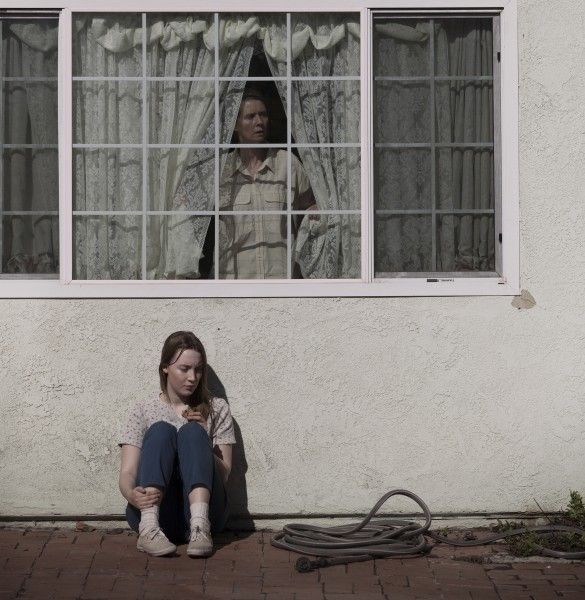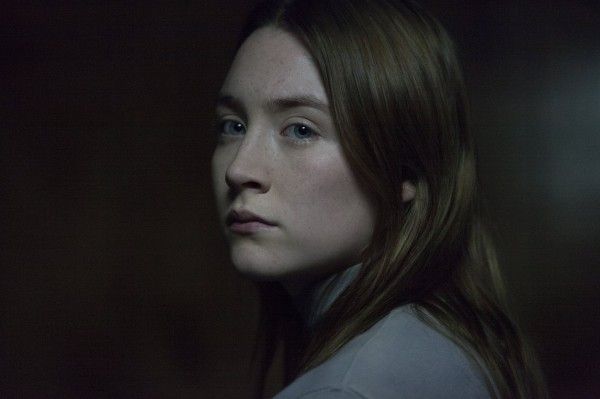Nikole Beckwith has a great collection of ideas with her debut feature Stockholm, Pennsylvania, and fails to effectively delve into any of them. The intriguing premise leads to explorations of bonding and bondage (not the kinky kind; the imprisonment kind). But the movie struggles to build compelling characters, and when it does, we rarely get to spend enough time with them or delve deeper into their psyches. The film is occasionally interesting and has some nice, subtle flourishes, but it’s mostly a tedious affair where almost everything that’s stimulating comes from the concept rather than the execution.
After being kidnapped when she was a child and held in captivity for 17 years, Leann (Saoirse Ronan) is reunited with her birth parents, Marcy (Cynthia Nixon) and Glen (David Warshofsky), and her kidnapper, Ben (Jason Isaacs), goes to jail. Leann informs her parents that her real name is “Leia” because Ben named her “after a princess” (she doesn’t know it’s from Star Wars), and while she tries to be polite to Marcy and Glen, she’s unsure how to act. She would rather be reunited with Ben, which further frustrates Marcy, who struggles to reconnect with her daughter.
Stockholm begins with a promising start as we see that Leia has been uprooted from what she considered normalcy, and as she tells her state-mandated psychologist, living with Glen and Marcy is like “being in a neighbor’s house,” an odd statement since we later learn that Leia was never allowed to leave Ben’s basement or even have a window. However, he never sexually abused her. Her upbringing is treated as odd rather than tragic, and this oddity begs the question of how exactly she turned out so weird. The occasional flashbacks are cleverly put together with Leia seeing them as if they shared the same physical space. It puts her back in the basement, or, as she saw it, home. These moments not only inform us about her character, but they also tell us a lot about Ben. But to reach these answers, we have to trudge through a slog of Leia being aloof and feeling alienated.
This is Ronan once again playing “Little Girl Lost”; it’s Hanna without the energy. Both characters were raised away from society, but whereas Hanna has agency and a purpose, Leia just putters about and says weird things about the world that she learned from Ben. And while we may find Leia’s beliefs unusual, they’re no stranger than anyone who was homeschooled with an unconventional curriculum. Beckwith has a great hook by asking us if life with Ben was so bad, or if her entire life was a lie, but this is never elaborated upon because eventually the filmmaker decides to seize on Marcy’s behavior at the cost of leaving Leia behind.
Granted, the movie starts to find a personality when it invests in Marcy, who shows us that Leia isn’t the only one who needs therapy. Nixon draws us into her character’s growing frustration and deteriorating mental state. It’s a reminder that if the movie chose to seriously mine a specific character’s personality—whether it’s Leia, Ben, or Marcy (Glen doesn’t do much)—there’s rich material. Marcy’s actions coalesce the thematic undertones even though it’s very on the nose and also leads to a conclusion that may as well utilize the “Dramatic Chipmunk” music.
Beckwith shows promise as a director as her thoughtful depiction of flashbacks as well as depiction of Leia’s alienation helps us delve into the character’s psyche. But from a storytelling perspective, it never takes off with its concept. As Ben tells Leia at one point, you spend just as much energy running a mile in place than running a mile in any direction. Stockholm, Pennsylvania chooses to run in place rather than venture out and discover the unexpected.
Rating: C-
Matt’s Reviews:
Adam’s Reviews



